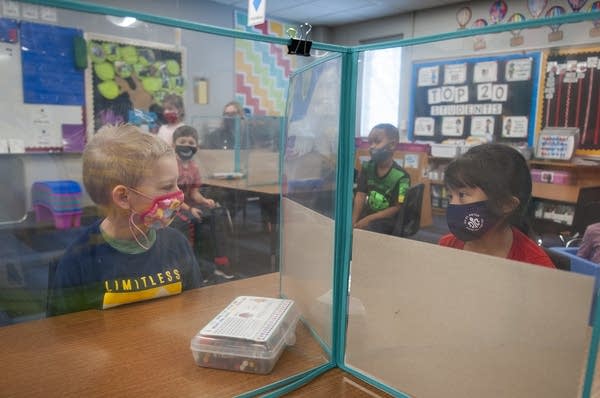School aid plan clears House as budget debate sharpens

Go Deeper.
Create an account or log in to save stories.
Like this?
Thanks for liking this story! We have added it to a list of your favorite stories.
A $107 million school funding proposal passed the Minnesota House on Tuesday that is geared toward developing an array of summer education programs to offset learning loss during COVID-19.
The bill approved on a 69-63 vote also would give school districts additional aid to deal with financial squeezes caused by enrollment drops linked to the pandemic, which pushed many students into home or private school settings.
Rep. Jim Davnie, DFL-Minneapolis, said many students from early ages through college need catch-up courses to avoid falling behind. His bill would set up grant pools for traditional courses, field trips, community enrichment programs, tutoring and more.
“With more school staff vaccinated, we have reason to hope and reason to act,” Davnie said. “We can make summer work for students and focus our work on those who need it most.”
Turn Up Your Support
MPR News helps you turn down the noise and build shared understanding. Turn up your support for this public resource and keep trusted journalism accessible to all.
Republicans argued against the bill, which passed on a near party-line vote.
They said urban districts would fare far better than most others due to the formula used to dole out aid and because much of the money would be awarded through competitive grants. They tried unsuccessfully to reroute the money to a flat allowance for eligible in-person summer courses, which they said would be more fair.
Rep. Steve Drazkowski, R-Mazeppa, questioned the need for the state funding plan at all, given that more than $1 billion is bound for Minnesota public schools through recent federal legislation.
“The reality is our schools are receiving plenty of money for them to hold summer school, fall school, winter school, spring school, day school, night school or any school that that school districts want to hold,” Drazkowski said.
A corresponding Senate bill has yet to move through committee. But Senate Republicans have expressed willingness to provide some aid to help districts deal with learning loss and enrollment drops during the pandemic.
Meanwhile, majority House DFLers released a $52.5 billion framework for the two-year budget they’ll attempt to assemble after an upcoming Passover/Easter recess.
It would significantly ramp up spending on education, putting $720 million of new money into public schools and tens of millions more into early education and higher education. It would also boost spending on health programs, including creation of a public insurance option for people who don’t get coverage through an employer.
The plan outlined by House leaders relies on unspecified tax increases to help pay for the boost. The tax proposal will be released in early April.
Minnesota has a projected $1.6 billion budget surplus and will get billions more from the latest federal stimulus law, although the timing and conditions around that money aren’t entirely clear yet.
House Speaker Melissa Hortman, DFL-Brooklyn Park, said the budget plan will be adjusted as more details come but will fit within a guiding principle.
“This is not the time for cuts or disinvestment in the state general fund budget,” Hortman said. “We cannot leave any Minnesotans behind, especially those who struggled the most during the pandemic.”
The House plan is larger than those put out by either DFL Gov. Tim Walz or majority Senate Republicans, who released a $51.9 billion benchmark last week.
House Republicans criticized the blueprint as rooted in fantasy given that no tax increases will survive in the GOP-led Senate.
“It’s tone deaf to be pushing for tax increases on struggling Minnesotans when government is flush with cash,” Daudt said in a written statement.
Lawmakers will spend the next several weeks crafting and passing detailed budget bills before three-way negotiations commence. The session is due to end on May 17.




